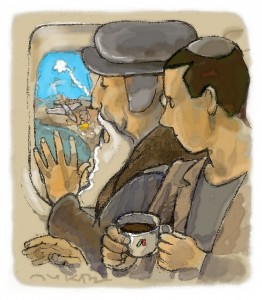I did not want to be on the plane I boarded in mid-July. I’ve been through a lot of wars, but this is the first one I was leaving the country for. How could I? I had two children in active service—a son who’s a special forces officer and a daughter in a combat infantry unit. The wonderful woman that my son was scheduled to marry in just weeks, herself an intelligence officer, had been called up as a reservist. Twice in the previous week sirens had gone off in Jerusalem as Hamas launched long-rage rockets in our direction.

drawing by Avi Katz
But tickets for the trip, for a visit to Dad and Mom in Denver and a literary conference in New York, had long since been purchased, and Ilana insisted that I not change my plans. “It’s not as if by being here you could change anything,” she pointed out.
Ilana’s admonishment was more pregnant than she realized. For Israelis like me, loyal Zionists who have for decades spoken out for Israeli democracy, tolerance, and accommodation with the Palestinians, the Gaza War was triply depressing. We, our family, our friends, and our country are under attack and our soldiers and civilians are being killed. Israeli bombs have killed hundreds of people in the Gaza Strip, embittering a Palestinian population with whom we must find a way to live. But, no less worse, death and destruction are turning the people on both sides ever farther away from accommodation and mutual understanding. Should we give up? Are we really impotent when it comes to peace?
The power to change, the refusal to accept the world as it is and the impulse to make it better, is fundamental to Judaism. The concept of free will is built into the Jewish Bible and into the wisdom of rabbinic literature, the building block of the ethical systems of nearly all Jewish theologians and philosophers throughout the ages. Not only can we change ourselves and determine our own actions, we believe, but we can also, through our actions and words, cause other people to change the way they act and think.
How ironic, then, to find myself seated on the plane next to a Calvinist.





